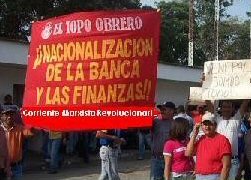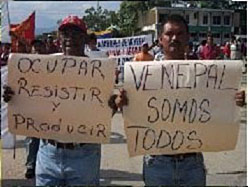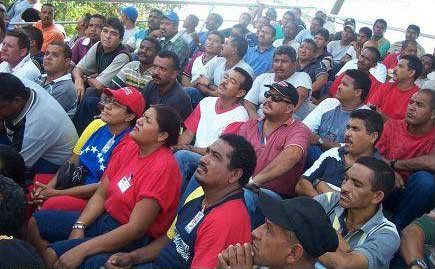The workers in the Venepal paper mill in Morón, Carabobo (Venezuela) are demanding that the government nationalises the company and puts it under workers’ control and management. This is an extremely important struggle which could be crucial for the future of the labour movement and the Bolivarian revolution in Venezuela.
International solidarity needed
 |
On September 7, 2004, the owners of Venepal, a paper mill in Morón, Carabobo, in Venezuela, decided to cease their operations and not pay their 400 workers their wages. This is not the first time something like this has happened. A year ago the company took the same decision alleging financial difficulties. At that time the workers decided to occupy the premises in a bitter eleven-week struggle. Now they are demanding that the government nationalises the company and puts it under workers’ control and management. This is an extremely important struggle which could be crucial for the future of the labour movement and the Bolivarian revolution in Venezuela.
Venepal is one of the main producers of paper and cardboard in Venezuela and its installations are located in Morón, in the industrial state of Carabobo. At one point it employed a total of 1,600 workers, controlled 40% of the national market and was one of the main producers of Latin America in this sector. But the company’s management allowed the paper mill to slowly lose market shares and revenues. In April 2002, at the time of the short lived military coup against Chávez, some of its main shareholders were present at the swearing in ceremony for the new, illegitimate, “president” Pedro Carmona. During the bosses’ lockout against the Chávez government in December-January 2002-03 the workers resisted attempts by the employers to paralyse the installations.
Finally, on July 4, 2003, the company declared bankruptcy and left 600 workers without jobs and owing them large amounts in back wages. The company had accumulated debts of $100million with the banks (60% with international banks, Citybank and Chase Manhattan Bank, and 40% with national banks), and a further $30 million with the Venezuelan state in unpaid taxes, national insurance contributions, gas and electricity bills, etc.
Workers’ control
 |
By that time, the revolutionary process that Venezuela has been living through since 1998 had given the workers enough confidence to take action to save their jobs. On a number of occasions president Chávez had called on workers to take over factories if the bosses shut down operations. After a mass meeting with the participation of the local communities, the workers decided to occupy the installations and run them under workers’ control and management. The conflict lasted for 77 days. At the time of the occupation the workers had the support of Bolivarian MP Iris Varela and even the commander of the local garrison, General Acosta Carles, was present to guarantee the security of the workers since Carabobo is a state run by the reactionary opposition. Rowan Jimenez, a trade union activist and member of the struggle committee, explains how during the occupation, “the workers organised production, broke all productivity records and reduced unproductive waste to a level never seen before” (El Topo Obrero interview, 16/09/04). At that time the workers demanded that the government transfer legal property of the installations to a worker-cooperative and that they should organise production. After three long months of struggle and negotiations finally an agreement was reached. This included a schedule for payment of back wages, the maintenance of between 400 and 600 jobs. The paper mill would reopen under its former owners and the state would invest in it by providing cheap credits.
The workers considered this as a partial victory, particularly taking into account the fate of other factories that were occupied at the same time – but they remained vigilant. Alexis Polanco, leader of the UNT in Morón, was clear in saying that he thought that the “contradictions with the company will continue and we must go towards a model in which the workers and the government run the company which should be state owned” (interview with El Militante, October 2003) Though there was no formal agreement, the workers, through the union, established a form of workers’ control. For instance in December 2003, when the company told them that their wages and Christmas bonuses would be paid in two instalments, one in December and the other in January, the workers replied that they would deliver production in two instalments as well! All decisions taken regarding production, inventory, hiring and firing, etc., were supervised by the workers. This was an uneasy truce that could not last.
Multinational asset stripping take over feared
 |
On September 7th of this year, the company again ceased operations and the workers’ struggle started again. The decision is also linked to an attempt to get rid of a militant workforce, hand over the company’s assets to paper multinational Smurfit and transfer production to Colombia. Smurfit is one of the largest multinationals in the world in the paper and cardboard sector and has been involved in Venepal before. The workers fear that this would be a ruthless asset stripping operation like the one Spanish airline Iberia carried out with Venezuelan national airline Viasa in the 1990s.
The workers have now taken over the installations and are demanding nationalisation under workers’ control as the only way forward. On September 16th a delegation of 100 workers went to Caracas to protest outside the Ministry of Labour. Edgar Peña, general secretary of the Union of Paper Industry Workers (SUTIP), affiliated to the UNT, explained how, “Smurfit has been breaking up the company and taking over certain parts of it with the idea of taking overall control of Venepal” (El Topo Obrero interview, 16/09/04).
Uniting the workers with the revolutionary people
The workers are clear about the need to involve the local community in the struggle to save their livelihood. Morón is a solidly revolutionary town of about 80,000 people where support for Chávez in the presidential recall referendum on August 15th reached 73%. The workers explain how Venepal could be used to benefit the revolution as a whole. On the one hand by producing paper for the “Misiones” (Bolivarian government social projects run by the communities) related to education, the Bolivarian University, etc. But there is more. The company’s installations include 5,000 hectares of land in Carabobo, Falcón and Yaracuy, most of it untilled, which the peasants have tried to cultivate against the wishes of the owners. There are also mills, abandoned houses, a school, grazing land for cattle, a baseball stadium, a hotel with a swimming pool, a power station and even its own airfield. Most of these installations are now standing idle and abandoned and the workers argue that they should be used as part of the revolutionary project to the benefit of the people. Land should be given to the peasant co-ops, the sports and educational facilities used by the communities, etc.
 |
Edgar Peña, General Secretary SUTIP |
For this reason, on September 22nd the workers in struggle organised a mass meeting with the local Electoral Battle Units (UBEs), the organisations set up to fight the August 15th presidential recall referendum and that are now becoming the local organising bodies of the revolutionary movement. Ten of the local UBEs were present representing hundreds of organised people. There was a roll call of all the different UBEs present and their representatives explained to the mass meeting how many people they could mobilise and how they were prepared to help the struggle (by providing food, transport, etc). The mood at the rally was electric. A representative from an UBE said: “we are in a revolution and this struggle is our struggle. We are fighting for the workers of Venepal and their families, for the defence of the revolution and for our country”, a Venepal worker added: “Here we see the strength of the working class, which is able to unite and mobilise the whole of the popular forces towards the same aim”.
Alexis Polanco, leader of the UNT in Morón and general secretary of the workers’ union in the Ferrelca metal factory, called on the Carabobo UNT to organise a regional march in support of the Venepal workers. “This struggle must become a rallying banner for the whole of the revolutionary movement. If Venepal falls into the hands of multinational Smurfit, jobs will be lost and an enormous amount of wealth which belongs to the Venezuelan people will be handed over to this multinational. This goes against the revolutionary project we are fighting for. The struggle of Venepal is the struggle of all those who support this revolutionary process, of all the exploited, and we can win this struggle”.
The next step in the struggle was a march through the streets of Morón on September 30th. More than 700 people participated and the mood was one of enthusiasm and confidence. It is clear that the victory of the revolutionary forces on August 15th, the third major defeat of the reactionary oligarchy after the April 2002 coup and the December 2002 bosses’ lock out, has had a major impact on the consciousness of the working class. In Carabobo alone, a state which concentrates a large share of the country’s private industry, dozens of factories are being organised in UNT affiliated unions. The most recent example is that of the workers at the Daimler-Chrysler assembly plant where – after 25 years of mafia type trade unionism of the CTV – 400 workers are setting up an independent class struggle union.
Organising working class solidarity
On October 6th there was a meeting in Valencia called by the Carabobo region of the UNT with more than 50 trade union leaders from the state to discuss organising solidarity with Venepal workers. Present were union leaders and shop stewards from Coca-Cola, Pirelli, Trimeca, Venezolana de Pinturas, Ford, General Motors, Proagro seccional Bejuma, Ferralsa, Owen-Illinois, Tubo Auto C.A., Protinal, Rodhia and Vicson, together with a delegation of Venepal workers. The solidarity from other unions was impressive. Ford shop stewards made a donation of 200,000 Bs, and Owen-Illinois trade union delegates handed over a cheque for 100,000 Bs. Workers at Venezolana de Pinturas decided at a mass meeting on October 9th to make a weekly donation to the hardship fund and oil workers at El Palito refinery agreed to donate 10,000 Bs per worker. Other factories agreed to organise factory gate collections, and a plan was drawn up to visit all factories organised by the UNT in Carabobo.
 |
A manifesto was passed at this meeting which calls for the nationalisation under workers’ control and management of Venepal, appeals to all UNT affiliated to support the struggle of the Venepal workers by participating in the mobilisation and raising the necessary funds to sustain it and it also calls for mass workplace meetings at all factories to explain the issue and raise weekly donations from all workers for the hardship fund. The manifesto also rejects the central government’s negotiations with pro-coup bosses that violate workers’ rights, denounces the complicity of reactionary judges with the machinations of the bosses and calls for a national solidarity rally at Venepal on October 16 to discuss how to advance the struggle. Finally the trade union leaders present called for a national and international solidarity campaign under the slogan “Nationalisation of Venepal under workers’ control”.
This is clearly a struggle which will be extremely significant for the future of the Bolivarian revolution in Venezuela. From the very beginning the parasitical Venezuelan ruling class has been bitterly opposed to this revolution, despite the fact that the movement has not yet touched their private property of the means of production. For decades they have been completely unable and unwilling to develop the country in any progressive way and therefore they are aware that a revolutionary movement to fulfil even the most basic needs of the masses (health, education, jobs, houses, land) would clash head on with their control of the country’s economy. And they are right. The struggle of Venepal workers shows clearly the way forward. In order to defend and advance the living standards of the masses of the Venezuelan people, the workers must take over control of the economy, so that it can be run through a democratic plan to the benefit of the majority of its people.
The workers are appealing for an international campaign demanding the nationalisation under workers control of this important industry.
Solidarity messages can be sent to:
rowanjimenez@hotmail.com and venezuela@elmilitante.org
Send messages also to the Venezuelan authorities asking for the
nationalisation of Venepal under workers control. A model resolution in
Spanish can be found at the end of this article:
http://venezuela.elmilitante.org/index.asp?id=muestra&id_art=1301 but you can use your own words. Messages should be sent to:
Presidencia de la República: presidencia@venezuela.gov.ve
Ministerio de Trabajo: dgtrabajo@mintra.gov.ve
Fax del Ministerio de la Presidencia: + 58 2122638179
Faxes del Ministerio de Trabajo: + 58 2124084250 y + 58 2124084246
again with copies to rowanjimenez@hotmail.com and venezuela@elmilitante.org
Raise donations from trade union organisation for the hardship fund of the workers. The best way to send the money is if this is channeled through the local Hands Off Venezuela campaigns in different countries. In cases where this might not be possible, donations can be sent directly to the Venepal
union (SUTIP) bank account: Cuenta de Ahorro 0108-0125-71-0200359704 del Banco Provincial, SUTIP